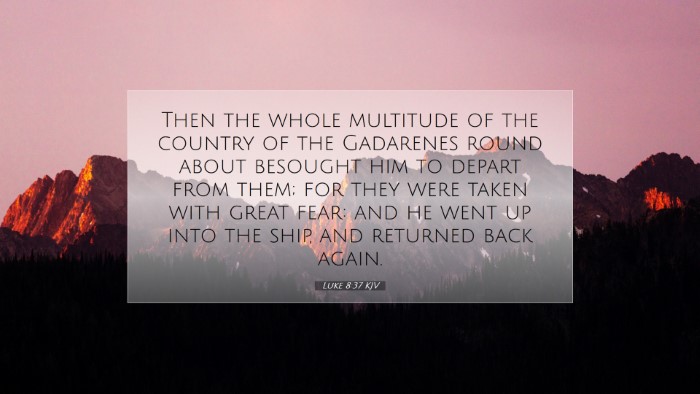Commentary on Luke 8:37
Luke 8:37 states: 'Then the whole multitude of the country of the Gadarenes round about besought him to depart from them; for they were taken with great fear: and he went up into the ship, and returned back again.'
Introduction
This passage belongs to the account of Jesus’ encounter with a demoniac in the region of Gadara. The gathering of the multitude, their fear, and their subsequent request provide profound insights into human nature, the nature of Christ, and the implications of His miraculous works.
Contextual Understanding
Before delving into the commentary, it is essential to understand the context. In the preceding verses, Jesus performs the miraculous work of casting out demons from a man who lived among the tombs. This man's transformation from a state of torment to peace highlights Christ's authority and compassion.
The Request of the Gadarenes
The request of the Gadarenes for Jesus to depart from their region deserves closer scrutiny. The multitude was 'taken with great fear' upon witnessing the power of Christ. As noted by Matthew Henry, this fear stemmed not only from awe at the supernatural but also from an unsettling realization that their lives would not remain unchanged in Christ’s presence.
- Fear of Change: The Gadarenes were accustomed to the presence of the demoniac; his condition seemed more manageable than the divine authority Jesus exhibited. Their fear illustrates the human tendency to cling to the familiar, even when that familiarity encompasses suffering and bondage.
- Societal Concerns: Albert Barnes highlights that the loss of the swine (which Jesus permitted to rush into the sea) signified not only economic loss but also a cultural disruption. They feared the societal implications of allowing such a powerful figure to dwell among them.
The Nature of the Fear
What kind of fear gripped the Gadarenes? It is a classic example of the fear that arises when confronted with divine authority. Adam Clarke posits that their fear was reflective of a deeper spiritual unrest. They recognized Jesus as a potential threat to their way of life, which often prioritizes comfort over righteousness.
Rejection of Christ
The request for Jesus to leave paints a troubling picture of human rejection. Here we see the stark contrast between the liberation of the possessed man and the bondage of the Gadarenes to their fears and societal norms.
- Misplaced Priorities: The multitude's desire for Jesus to depart reveals a prioritization of material and social stability over spiritual transformation. Matthew Henry emphasizes that their plea represented a refusal to embrace the spiritual awakening that Jesus offered.
- A Warning for Believers: This passage serves as a cautionary tale. Just as the Gadarenes rejected Christ out of fear, contemporary believers must examine whether they prioritize comfort over the call to discipleship.
The Response of Jesus
Jesus chose to leave. His withdrawal indicates a respect for human agency and the sorrow that often accompanies rejection. Albert Barnes argues that Christ's departure can be interpreted as a solemn acknowledgment that persistent resistance to grace can lead to the withdrawal of divine influence.
Theological Implications
This narrative reflects significant theological truths concerning God’s engagement with humanity.
- God’s Sovereignty and Human Will: The interaction underscores the tension between divine sovereignty and human volition. Even in His authority, Christ does not impose Himself where He is unwelcome.
- The Nature of True Transformation: True transformation comes with cost and commitment. The Gadarenes’ reluctance to engage with Jesus illustrates a broader theme of humanity's struggle with accepting profound change.
Lessons for Today
In our modern context, the passage challenges pastors, theologians, and believers to reflect on their relationship with Jesus. The questions arise:
- Are we welcoming of Christ's transformative work in our lives?
- Do we prioritize comfort over the call to follow Him, even into difficult places?
Concluding Thoughts
Luke 8:37 serves as a poignant reminder of the complexities of faith and the human condition. The fear that led the Gadarenes to request Jesus' departure can resonate with anyone confronted with divine holiness and authority. As believers, the call is not merely to invite Jesus into our lives but to submit wholly to His transformative power, regardless of the fear that may accompany such a decision.
References to Public Domain Commentaries
- Matthew Henry’s Commentary
- Albert Barnes’ Notes
- Adam Clarke’s Commentary


